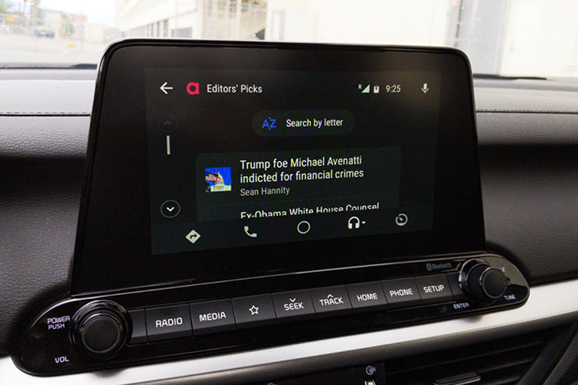Audioburst, a four-year-old startup developing AI that parses, labels, and segments live and recorded audio clips, today announced two new strategic and investment partnerships totaling over $10 million (an even $5 million split) from Japanese advertising firm Dentsu and car maker Hyundai, with participation from existing investors Samsung Ventures, Nippon, and Advanced Media. They come after a $14.4 million series A round and bring the company’s total raised to $25 million, ahead of its expansion into new smart speaker, mobile, in-car infotainment, wearable tech spaces, and its launch in Japan, the last of which it’ll mark in the coming months by adding Japanese language support.
“The investments signal an industry acknowledgment for consumer demand of voice-based experiences, and Audioburst’s unmatched ability to deliver that technology,” said cofounder and CEO Amir Hirsh, who added that the company will team up with Dentsu to build out channels that deliver rich listening insights and content to clients advertising in audio. “It also provides us the ability to expand and expedite our technology offering, and tap into a larger ecosystem of investors and partners in the car, media, advertising, and technology spaces.”
As for Hyundai, it’ll work with Audioburst to develop and deploy future infotainment systems integrated with the latter’s products. “At Hyundai, our mission is to have our cars connected by 2020 and provide our customers with the best possible in-car experience,” said VP Dr. Seung Ho Hwang. “Partnering and investing in Audioburst ensures we will lead the charge in a data-driven first-class audio experience.”

June 5th: The AI Audit in NYC
Join us next week in NYC to engage with top executive leaders, delving into strategies for auditing AI models to ensure fairness, optimal performance, and ethical compliance across diverse organizations. Secure your attendance for this exclusive invite-only event.
Audioburst taps natural language processing and automatic speech recognition to contextualize, transcribe, and index millions of audio segments daily from thousands of broadcasters and publishers, contributing to what it claims is the world’s largest library of short-form audio content (or “bursts”). It automatically attaches metadata to these bursts, which it transforms through its API into customized playlists and interactive voice-controlled experiences for partners like LG, Bragi, Samsung, and others.
For customers who take advantage, Audioburst can alert users to content as it’s being broadcast and surface engagement and distribution metrics through an analytics dashboard. Brands, meanwhile, get access to a portal with advanced and customizable modules, where they can edit content and promote it on social media.
Audioburst is largely focused on developers, but it offers voice apps for devices powered by the Google Assistant and Amazon’s Alexa that provide access to personalized news feeds, funnel weather briefings and traffic reports from local stations, and answer basic questions about the day’s news. Additionally, it hosts a web tool that lets users search for relevant sound bytes in audio streams by keywords and topics (e.g., “tech news” and “movies”).
But data is Audioburst’s bread and butter. Its platform generates what it calls a “listening identity” based on users’ unique listening patterns, interests, and preferences, which sponsors can use in tandem with performance-monitoring tools to target promotions and offers. It’s a bit like RAD, an open source technology spearheaded by National Public Radio that gives publishers and advertisers access to metrics like downloads, starts and stops, completed ad or credit listens, partial ad or credit listens, and more, and a bit like Apple’s Podcast Analytics and Pandora’s AMP advertising products and programs — albeit more holistic.
“The growing popularity of Amazon Echo, Google Home, and voice-activated apps has created an exponential demand for audio content,” explained Hirsh. “Users have learned to get their factual answers spoken to them by the different devices but are now looking for a winning content experience.”
There’s certainly market demand for analytics in the internet broadcasting sphere — and it’s no wonder. In 2016, 20% of search queries on Google’s mobile app and on Android devices were voice searches, and two years ago, the Internet Advertising Bureau (IAB) pegged the digital audio advertising market at $1.6 billion.
“We want to change the way people experience audio content. Audioburst is essentially the Spotify for spoken word content. Rather than tuning into a pre-programmed station or playlist, our AI builds a unique audio stream for every listener,” Hirsh said. “Each stream is built from short audio clips that are cut from diverse professional audio sources.”
Audioburst has hubs in New York, Palo Alto, and Tel Aviv, and its other partners include Chinese internet tech company ByteDance, Bose, Samsung’s Harman, and Radioline.


